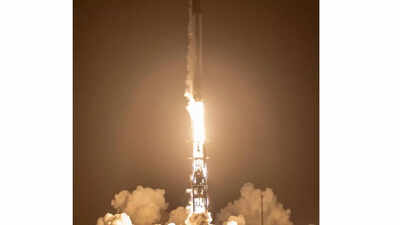
SpaceX successfully launched another batch of 26 Starlink satellites into
low Earth orbit
on June 16, further expanding its global broadband internet constellation. The Falcon 9 rocket lifted off from Space Launch Complex 4 East at
Vandenberg Space Force Base
in California at 11:36 p.m. EDT (3:36 a.m. GMT, Wednesday) on June 16. This mission marked the rocket booster’s third flight and was part of the Group 15-9 deployment. Just over eight minutes after launch, the satellites reached orbit, and final deployment occurred after a second stage burn nearly an hour into the mission. The flight also included a successful landing of the Falcon 9’s first stage on a droneship in the Pacific Ocean.
SpaceX Falcon 9’s third flight with 26 Starlink satellites
The Falcon 9 booster used in this mission, designated B1093, had previously flown two Starlink missions, most recently in May 2025. After separating from the second stage, the booster executed a controlled descent and landed upright on the autonomous droneship Of Course I Still Love You, stationed in the Pacific Ocean. The successful recovery ensures that the booster can be reused for future missions, continuing SpaceX’s goal of sustainable, cost-effective space launches.
Starlink satellites join a growing internet network
The 26 new satellites are part of the Group 15-9 cluster and will contribute to SpaceX’s ever-expanding
Starlink internet network
. With this mission, the number of active Starlink satellites in orbit exceeds 7,760. Though this launch did not include satellites with direct-to-cell capability, it strengthened the backbone of the Starlink system, which aims to provide
high-speed internet
globally, especially in remote or underserved areas.
Part of a bigger rollout
The launch followed closely on the heels of another Starlink mission from Cape Canaveral, Florida, on June 13. That earlier mission completed the deployment of SpaceX’s first-generation direct-to-cell satellites, a technology that will allow unmodified smartphones to connect in areas without traditional cellular coverage. While the latest California launch didn’t feature those satellites, it supports the wider infrastructure necessary for their function.As SpaceX continues to deploy more satellites, the company inches closer to its goal of providing seamless internet coverage across the globe. The frequent and reliable Starlink launches from both coasts of the U.S. demonstrate SpaceX’s growing dominance in
satellite internet
and commercial spaceflight, with more launches expected throughout 2025.

 5 hours ago
51
5 hours ago
51




























 English (US)
English (US)